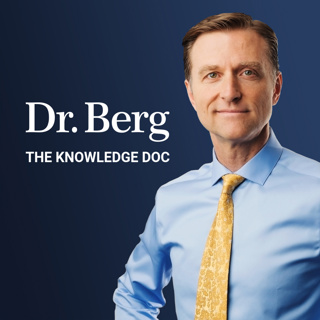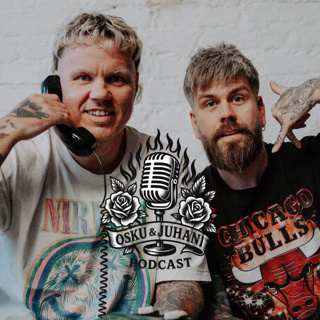
1 Tablespoon a Day Burns Belly Fat
Today, I’m going to tell you how to lose belly fat and burn stubborn fat fast. If you have a slow metabolism, this solution is for you! People who think they have a slow metabolism actually have an efficient metabolism. This means their body requires less fuel. To lose stubborn fat, you must get your body to waste more fuel. The mitochondria are the body's “energy factories,” turning food into stored energy, known as ATP. Uncoupling occurs when the mitochondria make less ATP and more heat. Resveratrol is a natural mitochondrial uncoupler. It’s found in grapes, cranberries, blueberries, dark chocolate, pistachios, and Japanese knotweed. Resveratrol is also made into a powder supplement. One tablespoon per day can help reduce belly fat by encouraging mitochondrial uncoupling. Ketones can cause mitochondrial uncoupling and improve the function of the mitochondria. Cold therapy, exercise, fasting, green tea, saunas, and jacuzzis also cause mitochondrial uncoupling. The following factors can hinder mitochondrial uncoupling, making it difficult to burn fat: • Excess calories • Aging • Sedentary lifestyle • Heavy metal exposure • Certain medications (statins, beta-blockers, Metformin, antibiotics) DATA: https://pubmed.ncbi.nlm.nih.gov/30421...
22 Touko 20246min

AVOID Ginger if You Have THESE Problems
In this podcast, we’ll discuss some of ginger’s health benefits and when it may not be an appropriate remedy. For thousands of years, ginger has been used as a powerful remedy for many conditions. Some of the amazing benefits of ginger include: • Antimicrobial properties • Anti-inflammatory properties • Anti-diabetic properties • Anti-cancer properties • Helping with menstrual pain • Helping with arthritis • Increasing HDL • Improving heartburn One of the most well-known uses of ginger is its ability to relieve nausea. Ginger can help with nausea associated with chemotherapy, pregnancy, menstruation, and surgery. Ginger has some contraindications, so it may not always be the best remedy for you. Don’t take ginger if you’re on Warfarin or other blood thinners like aspirin. Ginger helps thin the blood, so you also won’t want to take it if you have a bleeding disorder. Ginger inhibits insulin, so don’t take it if you’re on insulin. Ginger can lower blood pressure, so avoid it if you’re taking blood pressure medication. Ginger also stimulates the gallbladder, so don’t consume it if you have gallstones. DATA: https://www.ncbi.nlm.nih.gov/pmc/arti... https://www.ncbi.nlm.nih.gov/books/NB...
21 Touko 20243min

Make SURE You're Not Deficient in This!!!
In this podcast, we’ll discuss the causes and symptoms of potassium deficiency. We need a lot of potassium—around 4700 mg per day! Most people eat a lot of junk food or processed foods high in salt and not enough potassium, which throws off the sodium-potassium ratio. Your body needs a 2:1 ratio of potassium to sodium. Every cell in the body has a sodium-potassium pump that helps to generate electrical current around the cell, which powers the nervous and muscular systems. Potassium is also important for the health of your blood vessels. Low potassium is one of the leading causes of high blood pressure; however, it isn’t often used in conventional medicine as a treatment. Over 90% of high blood pressure is essential hypertension, which means the cause is “unknown.” Here are some signs of potassium deficiency: •Fatigue •Muscular issues •Constipation •Tremors •Abnormal heart rhythm •Mental issues (delirium, hallucinations, psychosis, depression) •Headaches •Low back pain •Dizziness •Nocturia •Edema •Increased pulse rate •Increased risk of stroke The most serious symptom of a potassium deficiency is sudden cardiac death. If you have low potassium, your risk for sudden cardiac death increases by 10x. You could end up with low potassium if you’re not consuming enough potassium-rich foods like leafy greens, squash, nuts, shellfish, bone broth, avocado, pumpkin seeds, and sunflower seeds. Other potassium deficiency causes include the following: •Consuming refined sugar, refined starches, and refined grains •Stress •Steroids •Gut inflammation •Alcohol consumption DATA: https://www.ncbi.nlm.nih.gov/pmc/arti... https://journals.physiology.org/doi/f... https://www.ncbi.nlm.nih.gov/pmc/arti... https://academic.oup.com/eurjpc/artic... https://www.ncbi.nlm.nih.gov/pmc/arti... https://www.ncbi.nlm.nih.gov/pmc/arti...
20 Touko 20246min

This Vitamin Reverses GLAUCOMA?!
In this podcast, we’re going to talk about one of the best natural remedies for glaucoma. Glaucoma is a condition where there is increased pressure inside the eyeball. This puts pressure on the optic nerve and can diminish your vision and cause blindness. Around 80 million people in the world have glaucoma, and 50% of them are unaware that they have it. Research suggests that glaucoma could be an autoimmune disease, which would explain why this natural remedy is so effective! In 2014, a study involving over 6,000 people in Korea showed a very high correlation between people with low vitamin D and glaucoma. People with glaucoma had three times more problems with the vitamin D receptor. A German doctor named Dr. Harald Schelle uses high doses of vitamin D for numerous eye problems. Many autoimmune cases of glaucoma have a genetic problem with the vitamin D receptor, the conversion from the inactive to the active form of vitamin D, or an issue with vitamin D absorption. Collectively, these problems are referred to as vitamin D resistance. To combat vitamin D resistance, you must increase your dosage. The standard recommendation for vitamin D is 20 ng per ml, however this is outdated and inaccurate. Dr. Schelle says we should have between 100 to 150 ng per ml of vitamin D. Dr. Coimbra from Brazil has also seen excellent results using high doses of vitamin D for autoimmune conditions. He recommends starting with 1000 IUs of vitamin D per kilogram of body weight. For example, a person weighing 84 kilograms would need 84,000 IUs of vitamin D3 daily. To minimize the risk of calcium buildup in the arteries, try the following: •Don’t take a calcium supplement •Reduce your consumption of calcium-rich foods •Drink 2.5 liters of fluid daily •Take 100 mcg of vitamin K2 for every 10,000 IUs of vitamin D3 •Take 600 mg of magnesium daily Dr. Harald Schelle Link: https://www.kontaktlinsen-schelle.de/ DATA: https://pubmed.ncbi.nlm.nih.gov/11525... https://pubmed.ncbi.nlm.nih.gov/26997... https://pubmed.ncbi.nlm.nih.gov/33004... https://www.ncbi.nlm.nih.gov/pmc/arti... https://pubmed.ncbi.nlm.nih.gov/32234... https://www.frontiersin.org/journals/...
19 Touko 20247min

This Is One of the WORST Things You Can Eat!
In this podcast, we’re going to talk about one of the worst foods you could eat, especially for liver health. There are generally very few symptoms of liver problems. When I had liver problems, I experienced right shoulder blade pain and pain beneath my right rib cage. It’s a myth that liver damage is permanent. The liver is one of the only organs that can regenerate itself 100%. Another myth is that the liver is filled with toxins. The liver detoxifies poisons, it doesn't store them. The worst “food” or ingredient for your liver is seed oils. Seed oils are damaging, inflammatory, and high in omega-6 fats, specifically linoleic acid. Lard contains about 2.5% linoleic acid, and tallow only contains 0.7%. Corn oil contains 56.6% linoleic acid! Seed oils contain oxidized linoleic acid that can cause significant oxidative damage in the body, especially in the liver and the nervous system. The average diet is 25 to 30% seed oils, which is too much. Seed oils become lodged in our fat cells and the membranes surrounding the nervous system and can remain there for 2 to 3 years. Seed oils can’t be used for energy. They inflame the liver and contribute to insulin resistance. You should avoid seed oils, including canola oil, soy oil, and cottonseed oil, which are commonly labeled as vegetable oil. Always check food labels and avoid seed oils and foods that contain them. Replace seed oils with oils high in omega-3 fatty acids rather than omega-6. Reduce your consumption of grain-fed animal products and look for grass-fed meats. DATA: https://pubmed.ncbi.nlm.nih.gov/2646971/ https://pubmed.ncbi.nlm.nih.gov/17947... https://pubmed.ncbi.nlm.nih.gov/15051... https://www.ncbi.nlm.nih.gov/pmc/arti...
18 Touko 20248min

The MOST Common Deficiency in All Skin Diseases (Dermatitis)
In this podcast, we’re going to talk about dermatitis. Dermatitis means inflammation of the skin, and there are many different types. At their core, skin problems are either related to an allergy or an immune reaction. You can consider many cases of dermatitis as an over-reactive immune system. Topical and oral steroids are the most common treatments of dermatitis. They work by suppressing the immune system. Antibiotics are also commonly used to treat cases of dermatitis but often lead to a secondary infection. The superficial layer of your skin contains a multitude of microbes and acts as a barrier for your lymphatic tissue and blood vessels. These tissues are full of immune cells ready to protect you against foreign invaders. Dermatitis seems to respond positively to vitamin D. For example, vitamin D works to mitigate symptoms of contact dermatitis by lowering the histamine response. Vitamin D is the main regulator of the immune system. Skin conditions are typically worse in the winter when we get less vitamin D. They are also worse when a person is under stress. When you raise cortisol levels from stress, you deplete vitamin D. Vitamin D can decrease acne by shrinking and normalizing the sebaceous glands. This can help regulate the overproduction of oil, decreasing acne breakouts. Seborrheic dermatitis on the scalp is also known as dandruff. Vitamin D cream can help reduce dandruff. Eczema, psoriasis, vitiligo, and alopecia are all related to vitamin D deficiency. Microbes involved in certain skin issues can reduce the vitamin D receptors in your skin, allowing them to survive. DATA: https://www.ncbi.nlm.nih.gov/pmc/arti... https://www.ncbi.nlm.nih.gov/pmc/arti... https://dermazen.co/blogs/news/seborr... https://www.sciencedirect.com/science... https://www.ncbi.nlm.nih.gov/pmc/arti... https://www.jacionline.org/article/S0... https://www.unmc.edu/newsroom/2014/02... https://www.sciencedirect.com/topics/...
17 Touko 20245min

8 Ways to Heal Trauma (Physical) without Medication — Dr. Berg
In this podcast, we’re going to talk about eight ways to improve physical trauma. Inflammation is part of the body’s healing response. You can't heal without inflammation. Inflammation is only a problem when it becomes chronic. Inflammation is the most potent carcinogen. Anything that involves chronic inflammation increases your risk for cancer. When trying to resolve physical trauma, you want to fix the chronic inflammatory state. Let’s take a look at eight ways to improve physical trauma. 1. Isolate and eliminate the problem Find out if a food or habit is causing your problem. The carnivore diet or the keto diet can help eliminate issues caused by certain foods. 2. Contrast therapy Alternate between hot and cold therapy. Try a sauna, cold therapy, or hot and cold showers. This increases circulation in the lymphatic system and improves inflammation at the cellular level. 3. Exercise One of the most potent things for chronic inflammation is exercise. When you have an injured body part, there is a lack of motion in that area. Putting your body into motion may help reduce inflammation. 4. Stretching Stretching can help you sleep, improve joint health and motion, and improve posture. It can also break up scar tissue that’s causing inflammation. 5. Vitamin D, omega-3 fatty acids, B3, polyphenols, methylene blue High levels of vitamin D can help remodel tissues in the body. Vitamin B3, omega-3 fatty acids, and polyphenols may help reduce inflammation. Methylene blue is one of the first synthetic medications. It can help reduce inflammation at the cellular level and helps to support the mitochondria. 6. Opposite technique Apply pressure on the opposite side of the body as your pain or trauma. 7. Fasting Fasting is a surprising way to reduce inflammation in the body. 8. Shockwave therapy This unique therapy is painless and helps target scar tissue and inflammation. Video on Methylene Blue: ▶️ • Fascinating Health Benefits of Methyl... Acupressure Playlist: ▶️ • Sciatic Nerve Pain Be Gone: Dr. Berg'... Video on niacinamide: ▶️ • The #1 Best Vitamin for Arthritis (NO...
16 Touko 202410min

The Most Dangerous Ingredient in Protein Powder (Mass Gainer)
In this podcast, we’re going to talk about the worst ingredient found in many protein powders: maltodextrin. This dangerous ingredient increases acne, bloating, gut inflammation, mental irritability, anxiety, and insomnia. It’s highly addictive because it increases dopamine. Maltodextrin promotes acid in your mouth, which increases cavities, and it spikes blood sugar more than sugar! If you consume it repeatedly, it can cause belly fat, high cholesterol, fatty liver, and other health problems. Maltodextrin is often one of the first ingredients in many protein powder products, which means it makes up most of the product. It’s made of inedible dent corn that’s ground and treated with chemicals. It’s typically heated, pressure-treated, decolorized, and deodorized. After this process, you’re left with maltodextrin powder, which can then be used as a filler to add bulk to different products. Consuming maltodextrin powder has no benefit. It’s classified as a carbohydrate but acts as a sugar in the body. The glycemic index tells you how much an ingredient will spike your blood sugar. Maltodextrin has a glycemic index between 105 and 185, which is higher than glucose and table sugar! Many protein powders contain 50 grams of whey protein per serving combined with 253 grams of carbohydrates from maltodextrin. Your need for many vitamins and minerals increases when you consume this many carbs. Ultra-processed foods like maltodextrin cause oxidation and inflammation in the body. Maltodextrin also causes significant insulin and blood sugar spikes. It may cause you to wake up groggy and have low blood sugar the day after consuming it. This will cause you to want more, creating a vicious cycle that eventually leads to insulin resistance. To build muscle, you need exercise and protein, not high doses of refined sugar!
15 Touko 20246min





















